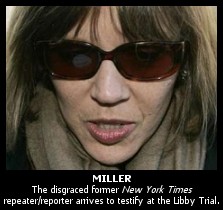*** Special to The BRAD BLOG
*** by Libby/CIA Leak Trial Correspondent Margie Burns
 ...And the rest is history. Or at least current history as it is unspooling in Courtroom 16 of the Prettyman Courthouse in D.C., in the Perjury Trial of I. Lewis "Scooter" Libby.
...And the rest is history. Or at least current history as it is unspooling in Courtroom 16 of the Prettyman Courthouse in D.C., in the Perjury Trial of I. Lewis "Scooter" Libby.
Today, following a long, leisurely courtroom session with witness David Addington, the government lawyer for Vice President Cheney as opposed to Cheney’s private attorney, prosecution witness Judith Miller was escorted into the courtroom a little after 2:00 p.m.
Just in time to contradict her previously friendly “deeper-background” “former Hill staffer” source, Libby. The one who was Chief of Staff to the Vice-President of the United States.
Giving her current occupation as “freelance journalist” and her former employer as the NYTimes, Miller laid out under prosecution questioning the basic chronology of her acquaintance with Libby. Miller testified that she came to know Libby through her book Germs, co-authored with Stephen Engelberg and William Broad. The book, basically a highly torqued argument in favor of being very afraid of bioweapons, came out on September 10, 2001. In spite of being given a free taxpayer-funded boost by then-New York mayor Rudy Giuliani, it did not rocket to the top of the bestseller lists immediately; however, the anthrax attacks, which began a few weeks after 9/11, did enhance sales. At least the book mentions (eventually) that anthrax spores can be killed by direct sunlight, a fact that boosters of war with Iraq seem to have overlooked.
Engelberg had interviewed Libby in the course of writing the book, Miller testified, and found him helpful, so Miller later – “some time between 9/11 and the beginning of the war with Iraq” – phoned Libby and asked to see him. She and Libby met in the Old Executive Office Building; he said he liked her writing on WMDs and terrorism; she expressed a wish to talk with him often; he said “fine” but on condition that his name not appear in print; she said “fine” to that.
A neocon marriage of minds between government official and sympathetic journalist, one might think, and one would be right...
Miller testified that she spoke on the phone with Libby about two or three times but never emailed him, not having his email address. Through early 2003 she was embedded with “WMD hunters” in Iraq, “with no access to newspapers”; returning to the U.S. on June 8, 2003, Miller said, she was “surprised” to find “great debate,” “angry” debate over whether the White House had lied about Iraq WMDs. In response to questions, she said that some of the anger was directed at the White House, some at the news media, and some at her.
On June 23, 2003, Miller met with Libby for an off-the-record discussion. She described him – as have other witnesses --- as angry, “frustrated” and “annoyed” that the CIA seemed to be backing off publicly, beginning to “backpedal,” from its previous “unequivocal” support of findings that Iraq had WMD. [Actually, the Congressional report on the lead-up to the war supports a different and much more mixed reading of CIA signals, but more on that later.]
Miller testified in response to questions that the topic of Joseph Wilson and his trip to Niger came up in this conversation. Libby told her that the vice president did not know that Wilson had been sent to Africa and had not received a “readout” on the trip. Regarding Wilson’s wife, Libby told Miller that “his wife” worked in the “Bureau” – a term Miller initially misread as referring to the FBI but then decided referred to the nonproliferation bureau in CIA. She included that reference in her notes, “parenthetically,” as an “aside.”
Regarding the White House and the CIA, Miller testified that Libby seemed “unhappy” and “irritated,” accused the CIA of leaking information and said that nobody from the CIA had come to the White House and said “this [intel on Iraq WMDs] is not good,” “this is not right.”
On July 8, 2003, Miller met with Libby at the St. Regis Hotel, at his request, for a two-hour conversation. Wilson’s column, debunking George W. Bush's infamous 16 words in the State of the Union speech suggesting that Iraq had purchased uranium from Niger, had appeared two days previously. Miller testified that the “ground rules” for this conversation were that this time Libby was to be quoted only on “deeper background” as “a former Hill staffer,” something he had not requested before. In Miller’s description, Libby was again “frustrated,” “unhappy.” He told her among other things that “Wilson’s wife worked at WINPAC.” Miller testified that no one had told her about Wilson’s wife as a CIA employee before June 23 or about Mrs. Wilson’s working at WINPAC before July 8.
Thus began the chronology in which Miller indisputably ended up spending 85 days in prison (“jail”). Cited after refusing to comply with a grand jury subpoena to disclose sources, she tried to avoid contempt charges in federal District Court in D.C. (“this courthouse”), lost; appealed to the appellate court, lost there; and appealed to the Supreme Court, which declined to hear the case.
She testified that she then went to jail for 85 days; received a “personal written waiver” from Lewis Libby; and the prosecutor narrowed his focus to the Libby-Plame matter. So Miller then appeared before the grand jury and was released – unlike Houston freelance writer Vanessa Leggett, who spent her entire six months in prison.
At the time of her grand jury testimony, Miller testified today, she couldn’t remember the time of a meeting referred to in questioning – but, returning to her office, she found under her desk “a shopping bag full of my notebooks” including a notebook with an “entire conversation” with Libby in it. Happening to be on the phone with her attorney at the time, she told him about the notebook, he turned it over to the prosecutor, and Miller returned to the grand jury.
As with Grenier, an earlier prosecution witness, the defense had a good time hammering Miller’s seemingly changing memory. All sides seem to be in a somewhat awkward situation in these matters. Neither prosecution nor defense has been so hard on any witness as to accuse one of previous perjury in front of a grand jury months or years back.
And nobody makes the political point that one big difference between a couple of years ago, and now, is that in 2003 the Bush White House was riding high in opinion polls, had the press terrified if not mesmerized, and had Congress in its grip. Neocon personnel riding the giant mechanical bull of our new military-industrial-security complex were far more disinclined then than now to try to get off.


 Trump Losing Streak Continues into SECOND Hundred Days: 'BradCast' 5/1/25
Trump Losing Streak Continues into SECOND Hundred Days: 'BradCast' 5/1/25 'Green News Report' 5/1/25
'Green News Report' 5/1/25
 100 Daze:
100 Daze: Campaign to 'Impeach Trump Again' Gains Fresh Momentum: 'BradCast' 4/29/25
Campaign to 'Impeach Trump Again' Gains Fresh Momentum: 'BradCast' 4/29/25 'Green News Report' 4/29/25
'Green News Report' 4/29/25 And Then They Came for the Judges...: 'BradCast' 4/28/25
And Then They Came for the Judges...: 'BradCast' 4/28/25 Sunday 'Desperation' Toons
Sunday 'Desperation' Toons Trump EPA Guts Enviro Justice Office: 'BradCast' 4/24/25
Trump EPA Guts Enviro Justice Office: 'BradCast' 4/24/25 'Green News Report' 4/24/25
'Green News Report' 4/24/25 Nation's Largest Broadcaster Hoaxes Viewers to Help Gut FCC Rules: 'BradCast' 4/23/25
Nation's Largest Broadcaster Hoaxes Viewers to Help Gut FCC Rules: 'BradCast' 4/23/25 Trump's FCC on Precipice of Ending All Limits on Corporate Control of Local TV Stations
Trump's FCC on Precipice of Ending All Limits on Corporate Control of Local TV Stations GOP Earth Day 2025 Hypocrisies and Dilemmas: 'BradCast' 4/22/25
GOP Earth Day 2025 Hypocrisies and Dilemmas: 'BradCast' 4/22/25 'Green News Report' 4/22/25
'Green News Report' 4/22/25 Pope Francis Dies, Trump Still Alive and Criming: 'BradCast' 4/21/25
Pope Francis Dies, Trump Still Alive and Criming: 'BradCast' 4/21/25 Sunday
Sunday  Sunday 'Zero Day' Toons
Sunday 'Zero Day' Toons 'Green News Report' 4/10/25
'Green News Report' 4/10/25 Soc. Sec. Expert Warns DOGE of Collapse, Privatization: 'BradCast' 4/10/2025
Soc. Sec. Expert Warns DOGE of Collapse, Privatization: 'BradCast' 4/10/2025 Trump Blinks, Chaos Reigns, Markets Spike Amid Tariff 'Pause': 'BradCast' 4/9/25
Trump Blinks, Chaos Reigns, Markets Spike Amid Tariff 'Pause': 'BradCast' 4/9/25 SCOTUS Deportation Ruling Grimmer Than First Appears: 'BradCast' 4/8/25
SCOTUS Deportation Ruling Grimmer Than First Appears: 'BradCast' 4/8/25 Cliff Diving with Donald: 'BradCast' 4/7/25
Cliff Diving with Donald: 'BradCast' 4/7/25 'Mob Boss' Trump's Trade Sanctions Tank U.S., World Markets: 'BradCast' 4/3/25
'Mob Boss' Trump's Trade Sanctions Tank U.S., World Markets: 'BradCast' 4/3/25 Crawford Landslide in WI; Booker Makes History in U.S. Senate: 'BradCast' 4/2/25
Crawford Landslide in WI; Booker Makes History in U.S. Senate: 'BradCast' 4/2/25 Judge Ends Challenge to GA's Unverifiable, Insecure Vote System: 'BradCast' 4/1/25
Judge Ends Challenge to GA's Unverifiable, Insecure Vote System: 'BradCast' 4/1/25 Bad Court, Election News for Trump is Good News for U.S.: 'BradCast' 3/31
Bad Court, Election News for Trump is Good News for U.S.: 'BradCast' 3/31
 VA GOP VOTER REG FRAUDSTER OFF HOOK
VA GOP VOTER REG FRAUDSTER OFF HOOK Criminal GOP Voter Registration Fraud Probe Expanding in VA
Criminal GOP Voter Registration Fraud Probe Expanding in VA DOJ PROBE SOUGHT AFTER VA ARREST
DOJ PROBE SOUGHT AFTER VA ARREST Arrest in VA: GOP Voter Reg Scandal Widens
Arrest in VA: GOP Voter Reg Scandal Widens ALL TOGETHER: ROVE, SPROUL, KOCHS, RNC
ALL TOGETHER: ROVE, SPROUL, KOCHS, RNC LATimes: RNC's 'Fired' Sproul Working for Repubs in 'as Many as 30 States'
LATimes: RNC's 'Fired' Sproul Working for Repubs in 'as Many as 30 States' 'Fired' Sproul Group 'Cloned', Still Working for Republicans in At Least 10 States
'Fired' Sproul Group 'Cloned', Still Working for Republicans in At Least 10 States FINALLY: FOX ON GOP REG FRAUD SCANDAL
FINALLY: FOX ON GOP REG FRAUD SCANDAL COLORADO FOLLOWS FLORIDA WITH GOP CRIMINAL INVESTIGATION
COLORADO FOLLOWS FLORIDA WITH GOP CRIMINAL INVESTIGATION CRIMINAL PROBE LAUNCHED INTO GOP VOTER REGISTRATION FRAUD SCANDAL IN FL
CRIMINAL PROBE LAUNCHED INTO GOP VOTER REGISTRATION FRAUD SCANDAL IN FL Brad Breaks PA Photo ID & GOP Registration Fraud Scandal News on Hartmann TV
Brad Breaks PA Photo ID & GOP Registration Fraud Scandal News on Hartmann TV  CAUGHT ON TAPE: COORDINATED NATIONWIDE GOP VOTER REG SCAM
CAUGHT ON TAPE: COORDINATED NATIONWIDE GOP VOTER REG SCAM CRIMINAL ELECTION FRAUD COMPLAINT FILED AGAINST GOP 'FRAUD' FIRM
CRIMINAL ELECTION FRAUD COMPLAINT FILED AGAINST GOP 'FRAUD' FIRM RICK SCOTT GETS ROLLED IN GOP REGISTRATION FRAUD SCANDAL
RICK SCOTT GETS ROLLED IN GOP REGISTRATION FRAUD SCANDAL VIDEO: Brad Breaks GOP Reg Fraud Scandal on Hartmann TV
VIDEO: Brad Breaks GOP Reg Fraud Scandal on Hartmann TV RNC FIRES NATIONAL VOTER REGISTRATION FIRM FOR FRAUD
RNC FIRES NATIONAL VOTER REGISTRATION FIRM FOR FRAUD EXCLUSIVE: Intvw w/ FL Official Who First Discovered GOP Reg Fraud
EXCLUSIVE: Intvw w/ FL Official Who First Discovered GOP Reg Fraud GOP REGISTRATION FRAUD FOUND IN FL
GOP REGISTRATION FRAUD FOUND IN FL

































